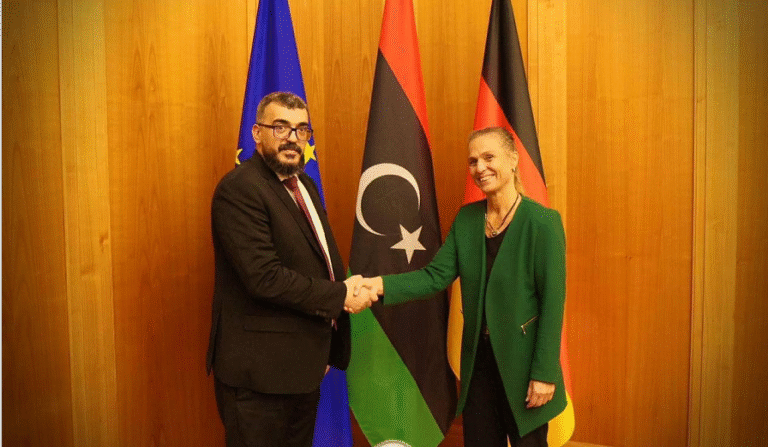Libya and Germany are working together to revive the Berlin Process, a diplomatic effort designed to bring peace and political stability to Libya. On Sunday, Abdullah Al-Lafi, a member of Libya’s Presidential Council, met with the German Ambassador to Libya, Ralf Tarraf, in Tripoli.
Their discussion focused on restarting the stalled political talks. Ambassador Tarraf shared updates from a recent meeting of the heads of the four key working groups formed under the Berlin Process. These groups focus on security, politics, economics, and humanitarian issues. The meeting, held with support from the United Nations mission in Libya, led to a new action plan for the next stage of the peace effort.
Both Al-Lafi and Tarraf agreed that the current political deadlock must be addressed with urgent and practical solutions. They said it was time to move away from broad discussions and instead focus on real, measurable results that can lead to long-term peace and stability.
Al-Lafi praised Germany’s ongoing efforts in helping Libya during its transition. He said Germany plays a key role in supporting dialogue among Libyan political groups and helping to maintain peace on the ground. He also emphasized that the next phase of the political process will need strong international support. Without this, he warned, the situation could become more complex and harder to resolve.
Ambassador Tarraf confirmed Germany’s full support for the work of Libya’s Presidential Council. He said that Berlin is committed to a full political settlement based on the Berlin Process and in line with UN-led efforts. Tarraf also stressed the need for stability and national reconciliation across Libya.
The Berlin Process began in 2020 as a global effort to end Libya’s long-standing conflict. It brought together key international and regional powers to create a shared political framework. Since then, it has faced several challenges, including delays in elections and disagreements between rival groups.
This new push to bring life back into the process comes at a time when Libya is still struggling with divided governance and delayed elections. The country remains split between east and west, with competing authorities and no clear path forward. Talks backed by the United Nations have yet to lead to a lasting agreement.
Germany has been a leading country in this process, hosting talks and encouraging peaceful solutions. The recent meeting shows that Berlin remains committed to helping Libya find a way out of its political crisis.
During the talks on Sunday, both sides highlighted the need for real progress on the ground. They agreed that actions must follow words, and that future efforts should lead to visible results that benefit the Libyan people.
Al-Lafi stressed that the Presidential Council is still working to ease tensions and support open talks between Libya’s rival groups. He said this work needs strong backing from countries like Germany and support from the United Nations to succeed.
Ambassador Tarraf echoed this message, saying Germany is ready to help in any way it can. He underlined the importance of international unity in supporting Libya’s peace efforts. He added that the Berlin Process remains a trusted path for guiding the country toward a stable and democratic future.
Both parties closed the meeting by agreeing to continue working closely together. They committed to promoting peace, restoring trust between Libyan groups, and helping to lay the foundation for national elections and long-term reconciliation.







